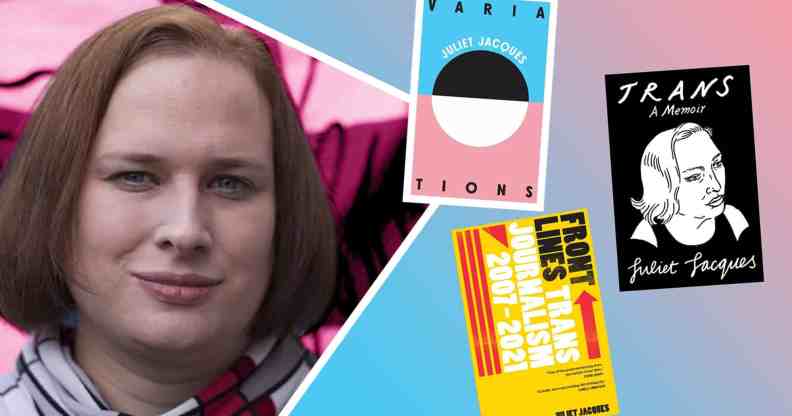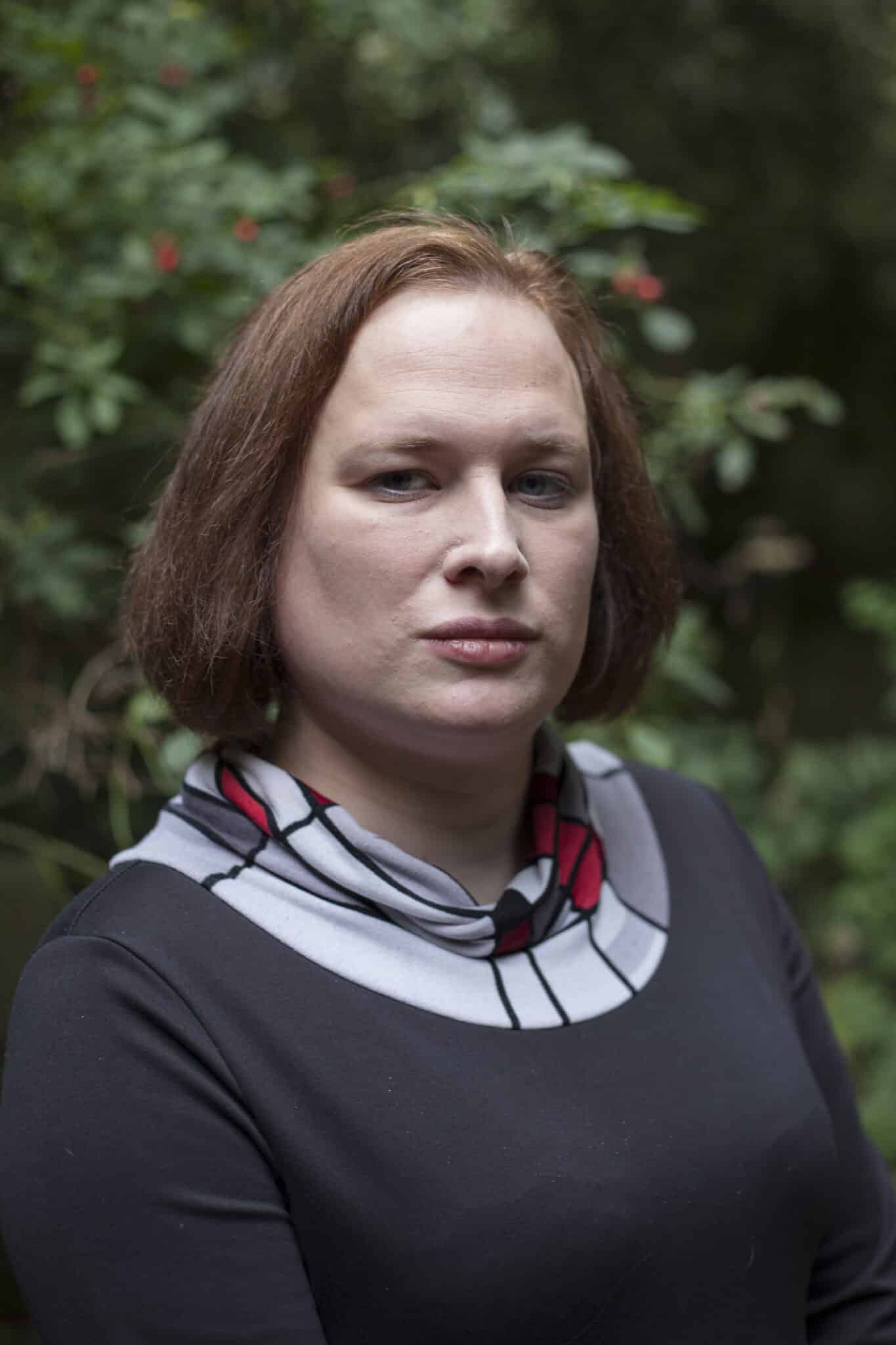Journalist Juliet Jacques on how UK media is trying to ‘crush’ trans people: ‘We’re not in control’

Juliet Jacques’ journalism has been compiled in a new collection called Front Lines. (Robin Silas Christian/PinkNews)
Mainstream media in the UK is trying to “crush” trans people – and there’s no sign of the attacks easing off, according to trailblazing journalist Juliet Jacques.
Juliet has a unique perspective on the issue. She’s a writer who made a name for herself writing about trans issues for major media outlets.
Around eight years ago, she could see that things were starting to get worse. Newspaper editors, once interested in platforming trans people’s stories, started to prioritise transphobic talking points pushed by a small but vocal group of self-described “gender critical” feminists.
“Particularly after the 2019 election, the mainstream media started saying, ‘No, the political issues you’re trying to bring to the table here are not acceptable to us – we will crush you,'” Juliet says. She describes that election as “a pretty emphatic victory for legacy media”.
I was surprised at how easy it was for them to exclude us.
“That’s been followed by an even greater centrality of transphobia within the discourse because a lot of the more material concerns we were trying to advance got crushed.”

Juliet Jacques in performance. (Supplied)
Today, it’s hard to see how things could be much worse. Many newspapers publish numerous articles each week pushing fear-mongering falsehoods about trans people.
It was that shift that inspired Juliet to move away from writing about trans issues full-time. Today, she’s a filmmaker and a writer who focuses on arts and culture.
That remarkable career is laid out in the new collection Front Lines. The book brings together Juliet’s journalism for the first time, but it also does something else – it contextualises the British media’s descent into transphobia, showing just how quickly editors and journalists jumped on the anti-trans bandwagon.
Juliet Jacques: ‘Trans people are not in control of their own stories’
Watching the British media lurch into transphobia from the eye of the storm was a learning curve for Juliet. She realised that, while newspaper editors will sometimes let trans people in the door, they’ll never let them have any power.
“Ultimately we’re not in control of those spaces. I was surprised at how easy it was for them to exclude us.”
That exclusion is what prompted Juliet to start writing more about arts and culture. In an alternative reality where the world isn’t quite so transphobic, that’s what she would have been doing all along.
“One reason why I did write about the arts a lot was to say to younger trans people, you don’t have to just write about this transgender debate that’s being held in mainstream media. You don’t have to just work on their terms. You don’t have to write about yourself and your identity at all, necessarily.”
The gender critical position has proved quite a useful recruiting tool for the far-right.
She also hopes younger trans journalists will see that they can create their own spaces where they can explore ideas and issues that matter to them.
However, she still thinks it’s important that those who feel up to the task counter some of the misinformation and scaremongering that’s put out there about trans people.
“I’m very grateful to Shon Faye in particular for her book The Transgender Issue because I think she very much took on that work upon seeing that no one else really had the stomach for it. Somebody’s got to do it,” Juliet says.
She’s also particularly keen to see people highlight “the role transphobia has played in building far-right coalitions”.

Juliet Jacques at the Swede Society. (Supplied)
“The gender critical position has proved quite a useful recruiting tool for the far-right and it has ended up being a way into far-right politics for a lot of people who, on any other issue, wouldn’t move into that ideological world view. I’ve seen it happen to people.”
Boycotts aren’t always the way forward
While Juliet ultimately moved away from writing for mainstream publications about trans issues, she’s got mixed feelings about the idea of outright boycotts on media outlets. She’s worried that anti-trans feminists will make further gains if trans people completely bow out of the arena.
“I take it on a case-by-case basis,” Juliet says. “A boycott is most useful if you can get lots of other people on side with it outside of the community who are boycotting in alliance with you, and if you can use it to apply pressure and shame.”
Juliet Jacques has “mostly” boycotted The Guardian herself – the newspaper has faced strident criticism for publishing anti-trans editorials and comment pieces – but she made an exception in 2020 when she wrote a piece drawing links between the far-right and the “gender critical” movement.
I don’t believe any journalism is objective. I’ve never believed that.
“I managed to get in some criticism of The Guardian, and would only do it on the condition I was able to do that. I hoped that might provoke some change in the newspaper, but it just didn’t, so I was like, ‘OK, I tried.'”
She continues: “I do think you have to ask tactically how useful it is to completely concede those spaces to opposition. If we had our own spaces that were equally prominent that had an equal amount of funding and clout, then it would be a different matter really, but at the moment we don’t.
“I completely respect anyone who does a total boycott of these places – I get it. Tactically, I think it has its limits and it only really works best as part of a wider strategy for winning hearts and minds.”

Juliet Jacques posing for a headshot. (Robin Silas Christian)
Despite the rampant transphobia in the British media, Juliet still believes good journalism has the power to “change people’s minds and advance positions”. That would be easier if everyone would admit that there’s no such thing as impartial journalism.
“I say in the introduction to the book, I don’t believe any journalism is objective. I’ve never believed that. Any journalist who claims to be objective, I just think they’re lying.”
A ‘tipping point’ could be on the horizon
Juliet isn’t an optimistic person by nature, and her hopes for the future of the media are dwindling. Still, she occasionally has moments where she thinks things could get better again. Polling shows that support for trans people in the UK is backsliding, but younger people are still largely supportive.
“There might well be some sort of tipping point,” she says. “The other thing is that material conditions are getting so bad – infrastructure doesn’t work, energy prices are through the roof, public transport works less and less and costs more and more, workers rights are constantly under assault.
“All of this stuff means that this American-style culture war approach to politics, I don’t know how much more it’s got in the tank really. But then I thought that after the 2017 election, so I don’t know.”
Juliet Jacques’ seminal collection of trans journalism, Front Lines, has landed! Pre-orders will be on their way soon. If you haven’t ordered yet, you can do so here: https://t.co/R9ctBBsw4W
Officially published next Thursday!
@zinovievletter pic.twitter.com/jjASLpiHiL
— Cipher Press (@CipherPress) July 13, 2022
Compiling Front Lines reminded Juliet that she’s done what she can to counter transphobia – it worked up to a point, but there’s only so much her writing can do when the media machine is intent upon hurting trans people.
“The main way it’s worked is that I’ve created a body of work that will hopefully continue to inspire people, both positively and negatively. Hopefully people will read these essays and pieces of journalism and like them and appreciate them.
“But also, I hope they’ll look at it and say, ‘Juliet and her generation tried doing all these things in mainstream media and it didn’t really work. What can we do differently?'”
Front Lines by Juliet Jacques is published by Cipher Press and is out now.

